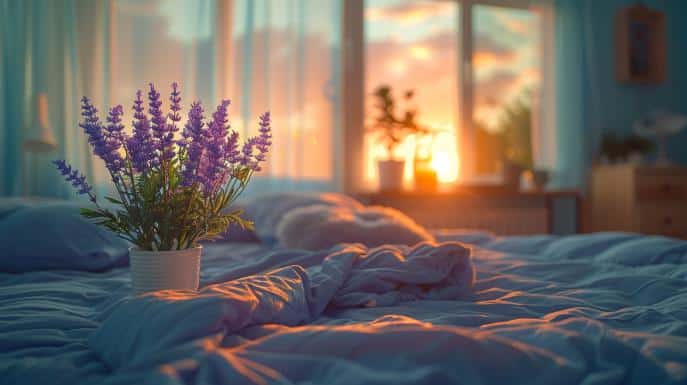Boa noite, ou será que deveria ser… finalmente uma boa noite? Descansar de verdade tornou-se um desafio para você?
No turbilhão da vida moderna, uma noite de sono restaurador é o elixir que muitos de nós buscamos, mas poucos conseguem saborear. Neste guia prático, desvendamos os segredos de um repouso verdadeiro. Desde a criação de um santuário pessoal de tranquilidade até a adoção de hábitos noturnos serenos – cada passo é uma peça do quebra-cabeça para noites de paz. Será que a temperatura ideal, os ruídos brancos ou a rotina pré-sono são as chaves para o reino dos sonhos? Vem com a gente explorar essas e outras estratégias para transformar as suas noites e revitalizar os seus dias.
How to create an ideal resting environment?
To ensure optimal sleep quality, the importance of a quiet room and dark is indisputable. Darkness signals to our brain that it's time to slow down, while silence helps us maintain a relaxed state. Did you know that the ideal temperature for sleep is around 18.3°C? This happens because a mild temperature contributes to the natural decline in body temperature during sleep. Now, in relation to unexpected noises, a practical solution is to use white noise or ambient sound devices that help mask external sounds, enabling a more uniform rest environment conducive to sleep.
What nighttime habits promote restful sleep?
For quality sleep, the key is a pre-sleep routine consistent. But what does it mean? Includes habits like taking a hot bath before bed and choose one light dinner. These practices send a signal to your body that it is time to relax and prepare for adequate rest.
A warm bath can relax your muscles and calm your mind, easing the transition into sleepiness. When you dim the lights and reduce stimuli, your brain begins to produce melatonin, the hormone responsible for sleep. Additionally, a light meal can prevent digestive discomforts that often keep people awake. However, what do we consider “light” and what is the ideal interval between dinner and bedtime? Ideally, a light meal can include easily digestible foods and should be consumed at least two hours before bed.
Implementing these steps into your nighttime routine can ensure deeper, more restful rest. For more details on these practices, check out the recommendations in this BBC article.
How does technology influence sleep and how to minimize its effects?
The influence of blue light on the circadian cycle is mainly harmful, as it can reduce the production of melatonin, an essential hormone for regulating sleep. To limit the use of electronic devices before bed, it is recommended to avoid screens at least one hour before bedtime. During this period, replace electronic devices with reading a book or practicing relaxation techniques, thus creating an environment conducive to sleep. Another important factor is avoid caffeine before bed, opting for decaffeinated drinks at night. These measures can help significantly improve sleep quality and ensure true rest.
What are the best sleep hygiene practices?
To ensure quality sleep, sleep hygiene is essential. Among the best practices, the regular bedtimes which, when consistent, synchronize the body's internal clock, promoting a deep sleep. But what else can be done?
A key point is the optimization of the rest environment. A comfortable bed and adequate accessories, such as supportive pillows and a mattress in optimal condition, are crucial—these elements directly impact the quality of your night's rest. Furthermore, the condition of the room is essential to achieve deeper sleep. Make sure it is as dark and quiet as possible, with a pleasant temperature, around 18.3°C. These simple changes can transform the quality of your sleep, leading to more refreshing mornings.
How to manage stress to improve sleep quality?
Managing stress is crucial to sleeping well. Simple techniques can make a significant difference, such as breathing techniques and the role of meditation in preparation for a night's rest. Some strategies that help control stress include breathing exercises such as the 4-7-8 method, presented by CNN Brazil, in addition to the regular practice of meditation for sleep. Mindfulness before bed can reduce anxiety and worries, facilitating peaceful sleep. Try taking time to relax your mind and body a few hours before bed, creating a serene ritual that leads to a restful night's sleep.
When to seek professional help for sleep problems?
Persistent problems sleeping may indicate sleep disorders. If you experience difficulty falling asleep, stay awake at night, or feel constantly fatigued during the day, these may be signs that you may be suffering from a sleep disorder.
O use of supplements melatonin may help temporarily, but it is important to consider medical advice to avoid addictions or side effects.
O impact of alcohol on sleep is often underestimated. Although it may induce sleep initially, it impairs its quality, leading to interruptions and a less restful state of rest. If alcohol use is affecting your sleep, this is a critical time to seek help professional. For more information about disorders and when to seek help, visit CNN Brasil Sleep Disorders.
As we navigate the waters of sleep quality, we pass through essential ports: from setting up a resting environment to adopting pre-sleep routines, without forgetting the impact of technology and healthy sleep hygiene practices. We also understand how stress management is crucial and the times when seeking professional help is the right path. Reflecting on the topics explored, it is clear that restorative nights support a productive and happy day. Therefore, may each detailed step become an invitation for you to embrace serene sleep, allowing your nights to be as rich as your days.
FAQ: How to Create an Optimal Rest Environment
How important is a dark and quiet environment for sleep?
A dark and silent environment is essential for a good quality of sleep, as darkness signals to the brain that it is time to slow down and silence helps maintain the state of relaxation necessary to fall asleep.
Why is bedroom temperature important for sleep and what is the ideal temperature?
Bedroom temperature is important for the natural decline in body temperature during sleep, and the recommended ideal temperature is around 18.3°C, providing a mild environment that facilitates falling asleep and deep sleep.
How can I create a pre-sleep routine that promotes restful sleep?
A consistent pre-sleep routine includes habits like taking a hot bath before bed and opting for a light dinner, signaling to the body that it's time to relax and prepare for adequate rest, with ideally a gap of at least two hours between dinner. and lie down.
In what ways can technology affect my sleep and what can I do to minimize these effects?
The blue light emitted by electronic devices can disrupt the production of melatonin, affecting the circadian cycle and, therefore, it is recommended to avoid screens at least one hour before bed, replacing them with relaxing activities such as reading a book or practicing techniques. of relaxation.
What are the best sleep hygiene practices to improve the quality of my rest?
The best sleep hygiene practices include maintaining a regular bedtime and optimizing the rest environment with a dark, quiet room and a pleasant temperature, as well as investing in a comfortable bed and suitable accessories such as supportive pillows and a good mattress.

